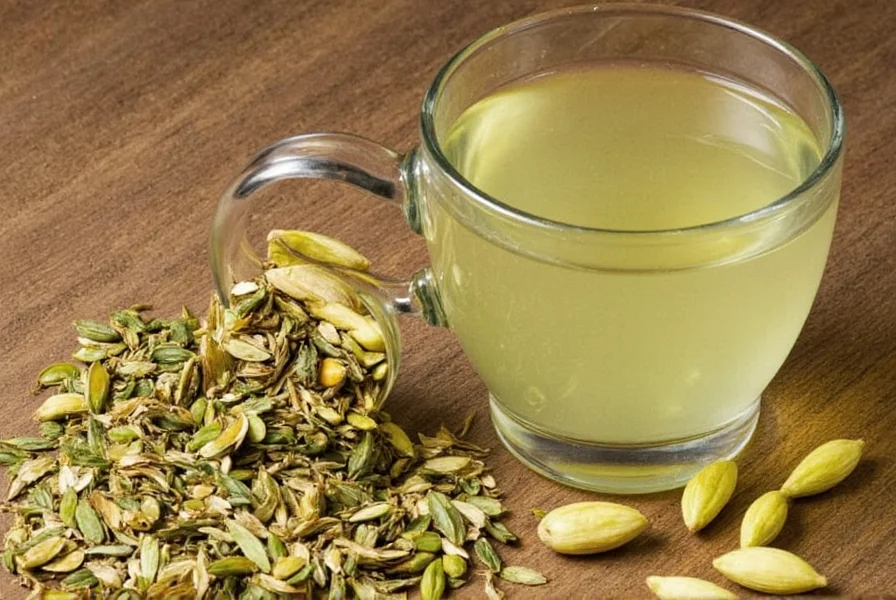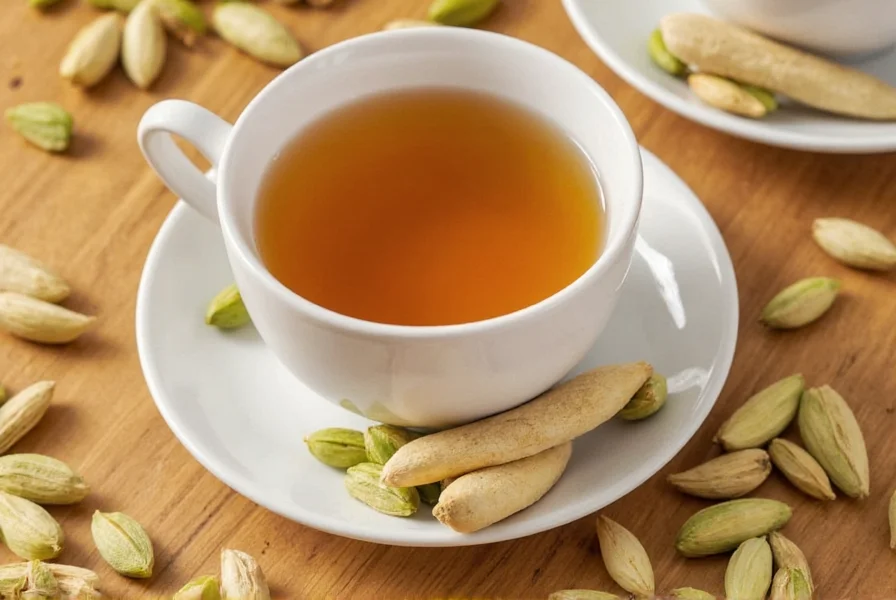Cardamom tea, an aromatic beverage made from the seeds of Elettaria cardamomum or Amomum subulatum, has been cherished for centuries across multiple cultures for both its distinctive flavor and therapeutic properties. This ancient spice, often called the 'queen of spices,' delivers a complex flavor profile blending citrus, mint, and herbal notes that creates a uniquely soothing beverage. Modern research continues to validate many of the traditional applications that have made cardamom tea a staple in holistic wellness practices worldwide.
Understanding Cardamom Tea Composition
The therapeutic potential of cardamom tea stems from its rich phytochemical composition. Cardamom seeds contain essential oils including cineole, limonene, and terpinolene, along with flavonoids and other bioactive compounds that contribute to its health-promoting properties. When brewed as tea, these compounds become water-soluble, creating a beverage that delivers both flavor and functional benefits.
| Key Compounds in Cardamom | Concentration | Associated Benefits |
|---|---|---|
| 1,8-cineole | 20-30% | Respiratory support, anti-inflammatory |
| Limonene | 5-10% | Digestive aid, antioxidant |
| Terpinolene | 3-7% | Antimicrobial, calming effects |
| Flavonoids | Varies | Antioxidant, cellular protection |
Top Evidence-Based Uses of Cardamom Tea
Digestive Health Support
One of the most well-documented traditional uses of cardamom tea involves digestive wellness. Research published in the Journal of Agricultural and Food Chemistry indicates that cardamom compounds stimulate digestive enzymes and promote healthy gastrointestinal motility. People commonly consume cardamom tea after meals to:
- Reduce bloating and gas
- Alleviate indigestion
- Support healthy gut microbiome balance
- Relieve occasional stomach cramps
This makes cardamom tea preparation for digestion a valuable natural remedy, particularly when combined with other digestive herbs like ginger or peppermint.
Respiratory System Benefits
The expectorant properties of cardamom tea make it particularly valuable during cold and flu season. The 1,8-cineole content helps loosen mucus and clear airways, while the warm steam from the tea soothes irritated throat tissues. Many people incorporate cardamom tea for respiratory health as part of their wellness routine when experiencing:
- Congestion
- Dry cough
- Sinus pressure
- Seasonal respiratory discomfort
Antioxidant and Anti-inflammatory Effects
Studies in the Journal of Medicinal Food demonstrate that cardamom contains potent antioxidants that combat oxidative stress. Regular consumption of cardamom tea provides:
- Cellular protection from free radicals
- Support for healthy inflammatory response
- Contribution to overall cellular health
- Complementary support for cardiovascular wellness
These properties make cardamom tea benefits for inflammation a compelling reason to include this beverage in a balanced wellness routine.

Culinary Applications Beyond Beverage
While enjoyed as a standalone tea, cardamom's versatility extends to numerous culinary applications. Chefs and home cooks value cardamom tea ingredients for enhancing both sweet and savory dishes:
- Base for poaching fruits like pears and apples
- Flavor enhancer in rice dishes and curries
- Infusion for baked goods including cookies and cakes
- Component in spice blends for meat rubs
- Flavoring for dairy products like yogurt and ice cream
Traditional Medicinal Practices
Across different cultures, cardamom tea traditional uses have evolved with regional variations:
- Middle Eastern cultures: Served after meals to aid digestion and freshen breath
- Indian Ayurveda: Used as part of detoxification protocols and for balancing digestive fire (agni)
- Scandinavian traditions: Incorporated into holiday baking and winter wellness routines
- Traditional Chinese Medicine: Employed for warming properties and to support spleen function
How to Prepare Cardamom Tea for Maximum Benefits
The preparation method significantly impacts the extraction of beneficial compounds. For optimal results when making cardamom tea:
- Crush 3-4 green cardamom pods to release essential oils
- Boil 8-12 ounces of fresh water
- Pour water over crushed pods (or 1 teaspoon ground cardamom)
- Cover and steep for 5-10 minutes (longer for stronger flavor and benefits)
- Strain and enjoy plain or with a squeeze of lemon
For digestive support, consume after meals. For respiratory benefits, inhale the steam while drinking. Adding black pepper may enhance absorption of certain compounds.
Safety Considerations and Potential Side Effects
Cardamom tea is generally safe for most people when consumed in culinary amounts. However, certain considerations apply:
- Those with gallstones should consult a healthcare provider before regular consumption
- May interact with blood-thinning medications due to coumarin content
- Pregnant women should moderate intake (consult healthcare provider)
- Excessive consumption may cause digestive upset in sensitive individuals
As with any herbal preparation, understanding proper cardamom tea dosage ensures safe enjoyment of its benefits.

Conclusion
Cardamom tea offers a remarkable combination of delightful flavor and functional benefits that have sustained its popularity across cultures and centuries. From supporting digestive wellness to providing antioxidant protection and enhancing culinary creations, this versatile spice delivers tangible value in a simple cup. By understanding the various uses of cardamom tea and preparing it properly, you can incorporate this ancient remedy into your modern wellness routine with confidence. Whether seeking relief from occasional digestive discomfort, respiratory support during seasonal changes, or simply a flavorful, caffeine-free beverage, cardamom tea presents a natural solution backed by both tradition and emerging scientific evidence.
Frequently Asked Questions
What are the primary health benefits of drinking cardamom tea regularly?
Regular consumption of cardamom tea provides several evidence-based benefits including improved digestion through stimulation of digestive enzymes, respiratory support via its expectorant properties, antioxidant protection against free radicals, and anti-inflammatory effects. Research indicates cardamom tea for digestion is particularly effective at reducing bloating and supporting healthy gut function. The beverage also contains compounds that may support cardiovascular health and provide calming effects for stress relief.
How does cardamom tea help with digestion and what's the best time to drink it?
Cardamom tea aids digestion by stimulating the production of digestive enzymes and promoting healthy gastrointestinal motility. The essential oils in cardamom, particularly cineole and limonene, help relax the smooth muscles of the digestive tract, reducing spasms and discomfort. For optimal digestive support, drink cardamom tea preparation 10-15 minutes after meals. This timing allows the compounds to work with your natural digestive process, helping to prevent bloating, gas, and indigestion. Many cultures traditionally serve cardamom tea after meals specifically for this digestive benefit.
Can cardamom tea help with respiratory issues and how should it be prepared for this purpose?
Yes, cardamom tea can provide respiratory support due to its 1,8-cineole content, which acts as a natural expectorant. To maximize respiratory benefits, prepare cardamom tea for respiratory health by crushing 4-5 cardamom pods and steeping in freshly boiled water for 8-10 minutes. The steam from the hot tea helps loosen mucus while the anti-inflammatory compounds soothe irritated airways. Inhale the aromatic steam before drinking for enhanced effect. This preparation is particularly beneficial during cold and flu season or for seasonal respiratory discomfort.
Are there any side effects or precautions to consider when drinking cardamom tea?
Cardamom tea is generally safe when consumed in moderate amounts, but certain precautions apply. Those with gallstones should consult a healthcare provider before regular consumption as cardamom may stimulate gallbladder activity. The coumarin content means it may interact with blood-thinning medications. Pregnant women should moderate intake and consult their healthcare provider. Excessive consumption (more than 3-4 cups daily) may cause digestive upset in sensitive individuals. Understanding proper cardamom tea dosage ensures you can enjoy its benefits safely.
How does cardamom tea compare to other herbal teas for digestive health?
Cardamom tea offers unique digestive benefits compared to other herbal teas. While ginger tea is excellent for nausea and peppermint tea helps with IBS symptoms, cardamom tea specifically targets bloating, gas, and sluggish digestion through different mechanisms. Research suggests cardamom's compounds work synergistically to stimulate digestive enzymes while relaxing gastrointestinal muscles. Unlike some digestive teas that may be too strong for daily use, cardamom tea provides gentle, regular support suitable for most people. Many traditional systems combine cardamom with other digestive herbs for comprehensive digestive tea blends.











 浙公网安备
33010002000092号
浙公网安备
33010002000092号 浙B2-20120091-4
浙B2-20120091-4